- Home
- Dan Simmons
Lovedeath Page 4
Lovedeath Read online
Page 4
But by the time of the Pepsi truck I’d been riding for years; I’d logged more time on a bike than behind the wheel of a car. Even while in ’Nam I’d bought a Kawasaki from a Marine on his way home.
So one day in Indianapolis I was riding my roommate’s 450 Honda—my own bike was in the shop—heading west on 38th Street a few miles north of the Speedway. An Econoline van, no windows in the back, was in front of me and slowed after pulling away from a stoplight at 38th and High School Road. I leaned and accelerated around him in the left lane, really kicking it the way you do after a few years of gaining confidence on a bike before your first big spill. It’s as if by blowing away all the heaps of Detroit pig iron bogged in traffic, we could get rid of the sense of inferiority and vulnerability those same heaps gave us on the open road.
Anyway, I must have been doing forty-five or fifty when I swerved around the Econoline. And then I discovered the reason for his slowing.
The Pepsi truck had pulled out of the corner Shell station and had been stopped by traffic from pulling into the eastbound lanes. The truck was white and as massive as a metal rhinoceros with an old Pepsi label on its side. Its high racks were filled with bottles. The truck took up the entire left lane and most of the right lane with a blue Chevy ahead of the Econoline van filling what was left. The van was a green wall to my right. Thick traffic rushed the other way three feet to my left, and the cab of the Pepsi truck stuck six feet further into their lane. A Camaro was slamming on its brakes behind me.
Usually, when in doubt, you lay the bike down as gently as you can, count on losing some skin, and hope for the best, I always wore a helmet—even back then in my stupid days—and usually wore boots and leather, but this was mid-August. I was in sneakers, cut-off fatigues, and my standard-issue olive-drab undershirt.
The underside of the Pepsi truck seemed to come down to the ground—mufflers, transmission housings, low steps, pipes, teeth, I don’t know what fuck-all—and it was moving slightly, creeping, not enough to get out of my way, but enough to give me a clear image of those left-rear double wheels rolling over whatever remained of me and my roommate’s Honda after I slid into the junk underneath. In Vietnam we called trucks like that a deuce-and-a-half. Now I was going to die under one. I decided to stay upright. I don’t think I hit the brakes hard enough to leave a skid mark. The left front wheel of that Pepsi truck was all I could see now and it was higher than my head. I figured that it might be softer than steel and headed straight for it.
Of course, all this wasn’t a linear thought process. Accidents that give you time to think aren’t real accidents. But everyone who has screwed up, looked at Death, and lived through it can remember the clarity of it all, the surreal quality of time slowed and stretched to near infinity. I’m convinced that the last fading thoughts in accident victims’ dying brains are of this phenomenon of stretched time, the almost painful acuity of perception, and astonishment at it all. It’s as if violent death were an astronomical black hole and entering it gives rise to all the slowed time, multiple realities, and stretched space that guys like Stephen Hawking talk about. That and four-letter words. A friend of mine on the National Transportation Safety Board air-crash review team once told me that of the hundreds of cockpit recorder tapes he’d listened to after airline tragedies, only a handful didn’t have a four-letter epithet in the last second or two.
Anyway, I roared around the van, saw the Pepsi truck, said “Oh fuck,” and hit him dead on.
Elisabeth Kubler-Ross and those other ghouls give us glowing reports of the newly dead sweeping down long tunnels, seeing light, hearing familiar voices, and feeling a benevolent warmth.
Crap.
Death is a Pepsi truck with no place to go. Dying is wham, feeling like the world’s biggest fuck-up and being jerked up and out of it all. Like a puppy being lifted out of its box by the nape of its neck. Like a chess piece being removed from the board by an angry player. Wham, jerk, gone.
Dick Pennington, one of my roommates, happened to be on duty at the ER when I was brought in and was sitting there when I came to the next morning. “Bobby,” he said gently, using the bedside manner they drill into residents at Methodist Hospital, “you’re a fucking mess.” I was just glad it hadn’t been Kurt on duty; he was the roommate whose Honda I’d just totaled.
A hundred and eighty stitches in my right leg, sixty-three in the left. Multiple fracture of the right arm. Concussion. Broken collar bone. When I met Kay a few weeks later at the Simon and Garfunkel concert, it was because she couldn’t see around me for all the casts, braces, and bandages.
Years later when I was discussing the insurance merits of state helmet laws with her, Kay surprised me with the opinion that motorcyclists shouldn’t be required to wear helmets or any other safety equipment. Usually Kay was so Ralph Naderish about such things that I had to ask her why. “Gets the feebs out of the gene pool,” she said with only a hint of a smile. “Motorcycles are as close to a force for natural selection as we can get in a civilized society.”
I still ride occasionally. I never took Scout anywhere on my bike and I wouldn’t dream of letting Caroline on one.
The kid working at the top of the Slide wasn’t chewing gum but his mouth hung open and his jaw muscles rippled slightly as he if were keeping in practice. “Both goin’ together?” he said. He sounded vaguely disapproving.
“Yeah.” I’d wrestled the sled into the groove of the trough, crawled in, and was getting Caroline settled in between my knees. The sled ahead of us had disappeared and the teenagers behind us were shifting from foot to foot in impatience.
“Yeah, okay, been on it before?” asked the kid who worked there. He didn’t wait for a response. “Okay, pull back on that stick to test your brakes, yeah, fine, forward makes it speed up, back slow, don’t crowd the sled in front of you, you gotta get off quick when it comes to a full stop at the bottom, Okay? Go!” He slapped me on the back. Caroline filled the cusp of my arms and legs, her hands below mine on the control stick. We rolled forward and down.
A lot of accidents are caused by too much caution. One of my earliest Orange File claims was from when I’d just started in the business and was working for State Farm in Indianapolis. Kay was still in the public schools then, working in a little high school in a town named Brownsburg about ten miles out, and I was driving all over the state looking at wrecks. Jesus, we were happy for some reason.
This particular claim—hell, I’ll just use their real names, the Johnsons—happened near the intersection of I-70 and I-465 and 74, not far from the airport. Mr. and Mrs. Johnson had both taken early retirement in order to realize their lifelong dream of traveling around America for a year or two before settling down in Florida or Arizona or somewhere. They were taking Mr. Johnson’s eighty-one-year-old mother with them, figuring that when it came time to put her in a nursing home they’d just leave her somewhere nice and go on about their travels. The problem was, both Mr. and Mrs. Johnson hated to drive and hadn’t been more than twenty-five miles from their tidy little suburban ranch house in more than a decade.
They’d bought a serious piece of traveling equipment—the largest camper then made, set on the back of a GM pickup that could have dragged six tons to the moon and back. Mrs. Johnson later told me that they would have bought a motor home—a full-sized RV—but that it had “looked too big and powerful” in the showroom. As it was, they passed up a Labrador in favor of a pit bull.
They never really got to test their new vehicle’s power. When I saw the GM after it had been towed, the odometer had 8.9 miles on it and 7.5 of that was the delivery from the dealer. The entrance to I-465 was 1.4 miles from the Johnson house.
Mr. Johnson was driving and he’d been doing fine until he got to the bottom of the curved entrance ramp and stopped. Mrs. Johnson had been calling the traffic from the passenger side and said it was “Okay to go.” Mr. Johnson didn’t go. He didn’t trust the accuracy of the pickup’s right-side exterior mirror. He was worried whether the
truck would accelerate properly. It was harder to handle than his Ford Crown Victoria.
Meanwhile, the Johnsons and their new camper sat at the bottom of the on-ramp while traffic increased on the southbound Interstate lanes and backed up behind them all the way to Morris Street above. Horns began honking. Mr. Johnson later admitted that he had sweated through his new JCPenney shirt.
“It looks better!” Mrs. Johnson called. She meant, she said later, that it looked like it might clear after the next cluster of high-speed traffic had passed.
Mr. Johnson did not wait to hear more. Without checking his mirrors he gunned it, flooded it, restarted it, and swerved out into traffic at a speed which the Indiana Highway Patrol later estimated at between seven and nine miles per hour.
At least three cars in the far left lane where the entrance ramp merged managed to change lanes. Two of those vehicles contacted at least three other cars, which caused a small chain reaction of fender benders, but none of that is relevant because none of them were insured by State Farm. The final vehicle in that particular high-speed cluster had neither time nor room to change lanes. That vehicle was an eighteen-wheel semi leased by Mother’s Own Baked Goods, Inc. out of Saginaw, Michigan. Every time I heard Mr. Johnson’s voice on the tape-recorded depositions referring to that “gol-durned Mother’s trucker,” I thought he was saying something else.
The Mother’s trucker had been on the road for nine hours and was doing approximately seventy-five miles per hour when he saw the Johnson’s pickup and oversized camper pull out in front of him. “The goddamned thing seemed to hop sideways and damn near stop in front of me,” he said later. “I’ve seen quadriplegics move faster than that old fart was going.”
The lanes to the right of the Mother’s trucker were filled with colliding automobiles. The left lane was clogged with traffic from the entrance ramp backed up behind the Johnsons. The Mother’s trucker did what he could—swerving as far right as possible without squashing a ’78 Volvo and repeatedly hitting his airhorns.
The blast from the approaching semi’s horns had an effect on our insureds. Mr. Johnson braked the camper to a full stop. Mrs. Johnson screamed.
The truck’s cab missed the Johnson’s camper, merely taking off the right outside mirror. The semitrailer almost missed. It was a matter of inches.
The state trooper I spoke to later over the after-hours drinks at the 911 Lounge on Washington Street said, “That rig opened up that camper like a big fuckin’ can opener going to work on a tin of tuna. Cleanest bit of highway surgery I’ve ever seen.”
The Johnsons were shaken but unhurt. They heard a sound—“Sort of like a giant can opener,” said Mrs. Johnson—felt a heavy vibration, and turned in time to see the Mother’s trucker’s semi and part of their own camper pass them on the right. “That’s when I remembered Mama,” Mr. Johnson said later.
It’s against Indiana state law to carry passengers in a separately configured or towed camping or recreational vehicle. The Johnsons said they hadn’t known that. They only knew that Mama had a headache, she’d planned to sleep for the first few hours of the trip, and that they hadn’t paid $32,000 to have Mama in the cab with them for their entire tour of America.
Mama wasn’t in the cab with them. She wasn’t in any of the camper’s four beds, or in the dining booth, or in one of the seats back there either. Mama had chosen that moment to use the bathroom.
The commodes in that brand of camper were chemical toilets set in a prefabricated, self-contained metal unit which was dropped into the right rear corner of the camper during the last stages of manufacture. “That son-of-a-bitchin’ little outhouse come out of there slick as you please,” said the state trooper at the 911 Lounge. “Only thing left behind was the door. Truck’d given a spin to the unit like one of them gyroscopes my kid used to play with at Christmas.”
“Mama,” Mr. Johnson said as his mother and toilet unit spun by him at a speed later estimated as only slightly less than the Mother’s trucker’s.
The driver of the ’78 Volvo later said in his statement: “I could see these two skinny white legs sticking straight out, horizontal. I think she had those pink, puffy slippers on that old ladies wear, but all I could see was this pink and white blur as the whole thing skipped down the highway.”
Two hundred and eighty-six feet. I know it’s not an exaggeration because I walked it myself with a measuring wheel while the state trooper paced it off beside me and his partner stopped traffic in that lane. For a while that stretch of I-465 always had a cop car parked along the median breakdown lane while some new guy was being told the story.
I don’t know the resolution of that claim because we moved to Denver not long after that. I know that the Mother’s trucker carrier sued State Farm, we sued them, several of the other involved cars’ drivers sued the Johnsons, Mr. and Mrs. Johnson sued the Mother’s trucker, and—this was the best part—Mama sued her son and his wife, not only for payment of medical bills resulting from the broken hip and bruised ribs, but for “reckless endangerment and grievous embarrassment resulting from public humiliation.”
I think it’s still in the courts.
Caroline and I came down the Slide as slowly as I could without bringing the sled to a stop. It was fast enough. The slope slanted at forty degrees or more much of the way and we must have been going thirty miles per hour on the straightaways. That’s negligible in a car but can be felt viscerally when you’re hurtling down a hill in the open with your rump two inches off the concrete. The teenagers behind us were shouting at us to speed up. I ignored them and concentrated on braking before the next corner so we weren’t too high on the curve.
“How do you like it?” I called to Caroline over the wind and the roar of rollers under the sled.
“Love it!” she screamed back. Her hair blew up against my chin.
A final set of curves, a lessening of steepness, an absence of trees, and we were braking to a stop on the long, level section at the bottom of the slope. I helped Caroline up and out, clumsily got to my feet, and lifted the bulky sled out of the trough. The teenagers passed us, grumbling and slouching.
“Again, Daddy, please? Please?” said Caroline.
“No way,” I said. The trick is to know when to be firm.
“Six-fifty, please,” said the woman behind the glass. “I told you it would’ve been cheaper to buy the ten-dollars-for-two-rides-each special.”
The dead bodies were kept in PSF-1, the Primary Storage Facility at Tan Son Nhut. There was a morgue at the base and another refrigerated portable unit near the main hangar, but PSF-1 was where the bodies waited between final processing and the flight home. Some of the idiots in the battalion called it the DEROS Hilton or Preboarding for Stupid Fuck-ups-1.
A lot of the young men I processed to be sent home from Vietnam were accident victims. Some of the accidents were combat or weapons related, but most were the result of mishaps with Jeeps or heavy equipment or those damn mopeds you saw everywhere in and around Saigon. Prairie Midland would have made a fortune selling premiums in Vietnam.
I remember being called out of the trailer I was using as an office to look at the body of a kid who’d been screwing around with his buddies, pretending to attach some C-4 explosive to an ARVN APC. This kid had lain down and pretended to stick grenades in the tread wheels as the APC rolled past, something his buddy said they’d seen in a movie called Darby’s Rangers, when the South Vietnamese driver’d gotten fed up. Seven tons of armored personnel carrier had backed over this young Spec-4. On reinforced asphalt, not mud.
I didn’t look at the body, but I remember that the body bag had looked as limp as my garment bag with only one suit in it. Later, doing the paperwork on him, I noticed that the kid was being shipped to Princeville, Illinois, a little town only a few miles from where I’d lived in Elmwood after we moved from Chicago.
It was in Elmwood that I first realized that I was really going to die someday. It was a Saturday evening in late August of the summer of 196
0, only a few days before school was scheduled to start again. I was twelve and ready to start seventh grade and had forgotten to get my “junior high physical,” even though the junior high was nothing more than some new classrooms tacked onto the same elementary school I’d been attending. Still, you couldn’t sign up for seventh grade unless you’d had your physical.
I have no idea how or why I’d been able to see our town’s only doctor late on a Saturday afternoon, but I had. Things were weird then. Physicians even used to come to sick people’s homes.
This particular doctor had fled from Hungary two years earlier. He blended right into life in Elmwood except that he dressed bizarrely, smelled really weird, combed his hair strangely, looked different, and spoke so almost no one could understand him. He was also a mean bastard. His name was Dr. Viskes but every kid in town called him Dr. Vicious.
I remember I’d received several shots—the old fashioned kind with the dull needles that went back into the autoclave. I suspect Dr. Viskes reused his until they were too dull to break the skin. Anyway, I was on my way to War Memorial Park to watch the Free Show. Elmwood’s only movie theater—forty-six seats—was closed in the summer because Don and Deedee Ewalt, the owners, always went up to their place on Big Pine Lake in Minnesota. But their son, Harmon, even though he was a successful dentist in Peoria, almost an hour’s drive away, had made a tradition out of bringing a 16-mm projector and film canisters of some recent release to give the Free Show against a white canvas screen stretched across the front of the bandstand in Memorial Park. Families picknicked on blankets or watched from their cars pulled up to the curb, and it was an infinitely more pleasant experience than going to Ewalt’s Theater.
This was the last Free Show of the summer and I was rushing there after my physical, sore arms and all, when it suddenly struck me that I was going to die.
Not then, probably. Not that night, perhaps. But someday. Inevitably. Irrevocably.
I felt as if the wind had been knocked out of me. I stumbled backward and sat on a low stone near where the grass met the asphalt of Third Street. I could hear the sound track of the cartoon from the Free Show a block away.

 The Terror
The Terror Endymion
Endymion Hyperion
Hyperion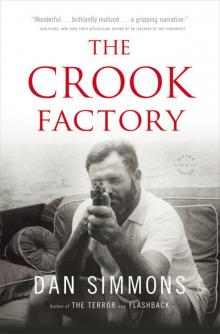 The Crook Factory
The Crook Factory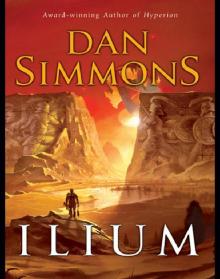 Ilium
Ilium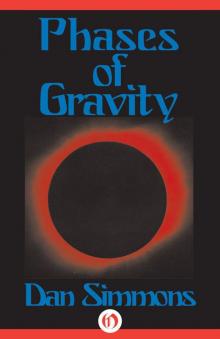 Phases of Gravity
Phases of Gravity Hardcase
Hardcase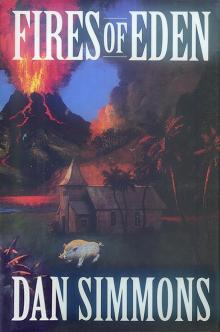 Fires of Eden
Fires of Eden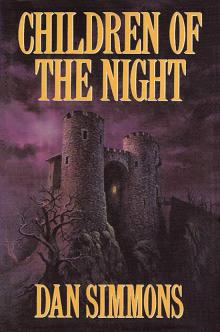 Children of the Night
Children of the Night Muse of Fire
Muse of Fire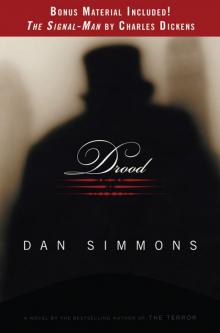 Drood
Drood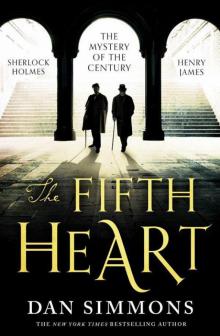 The Fifth Heart
The Fifth Heart Carrion Comfort
Carrion Comfort The Hollow Man
The Hollow Man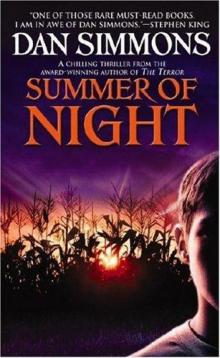 Summer of Night
Summer of Night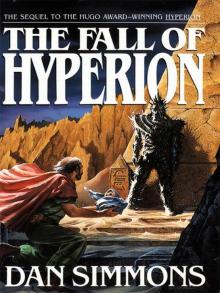 The Fall of Hyperion
The Fall of Hyperion Black Hills
Black Hills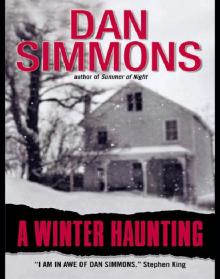 A Winter Haunting
A Winter Haunting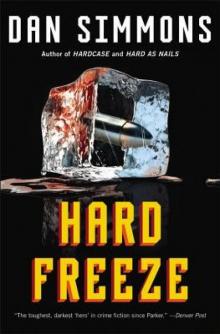 Hard Freeze
Hard Freeze Prayers to Broken Stones
Prayers to Broken Stones Hard as Nails
Hard as Nails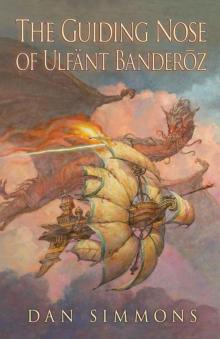 The Guiding Nose of Ulfant Banderoz
The Guiding Nose of Ulfant Banderoz The Rise of Endymion
The Rise of Endymion Orphans of the Helix
Orphans of the Helix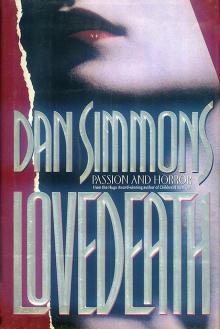 Lovedeath
Lovedeath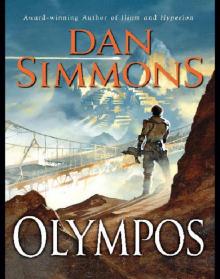 Olympos
Olympos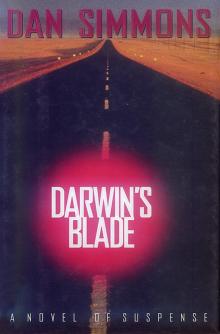 Darwin's Blade
Darwin's Blade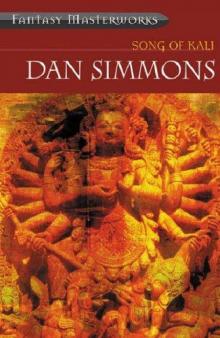 Song of Kali
Song of Kali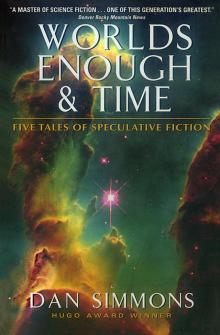 Worlds Enough & Time: Five Tales of Speculative Fiction
Worlds Enough & Time: Five Tales of Speculative Fiction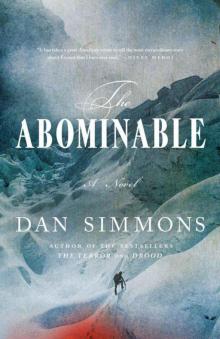 The Abominable
The Abominable The Death of the Centaur
The Death of the Centaur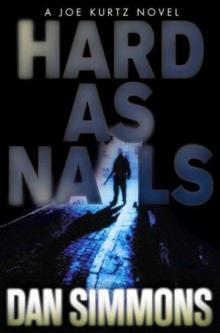 Hard as Nails jk-3
Hard as Nails jk-3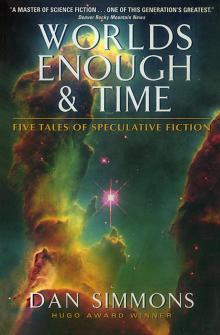 Worlds Enough & Time
Worlds Enough & Time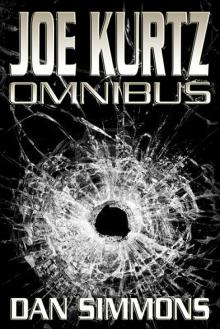 Joe Kurtz Omnibus
Joe Kurtz Omnibus The Hyperion Cantos 4-Book Bundle
The Hyperion Cantos 4-Book Bundle Rise of Endymion
Rise of Endymion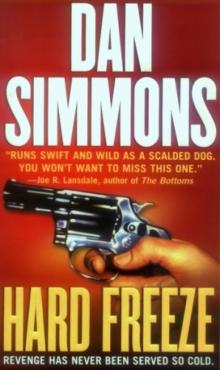 Hard Freeze jk-2
Hard Freeze jk-2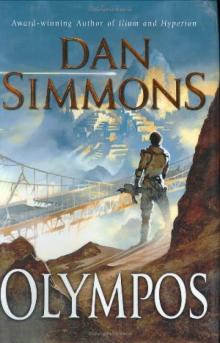 Olympos t-2
Olympos t-2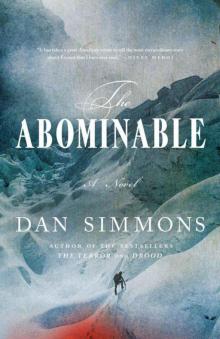 The Abominable: A Novel
The Abominable: A Novel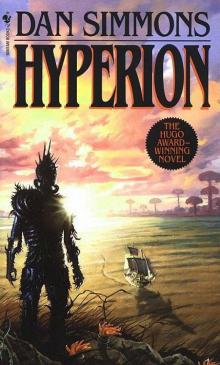 Hyperion h-1
Hyperion h-1 Remembering Siri
Remembering Siri Black Hills: A Novel
Black Hills: A Novel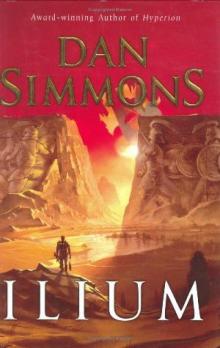 Ilium t-1
Ilium t-1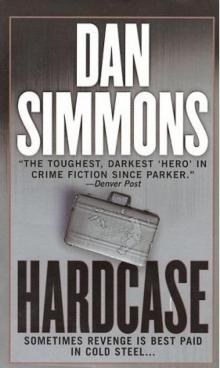 Hardcase jk-1
Hardcase jk-1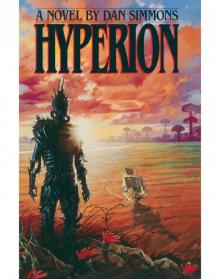 Hyperion 01 - Hyperion
Hyperion 01 - Hyperion